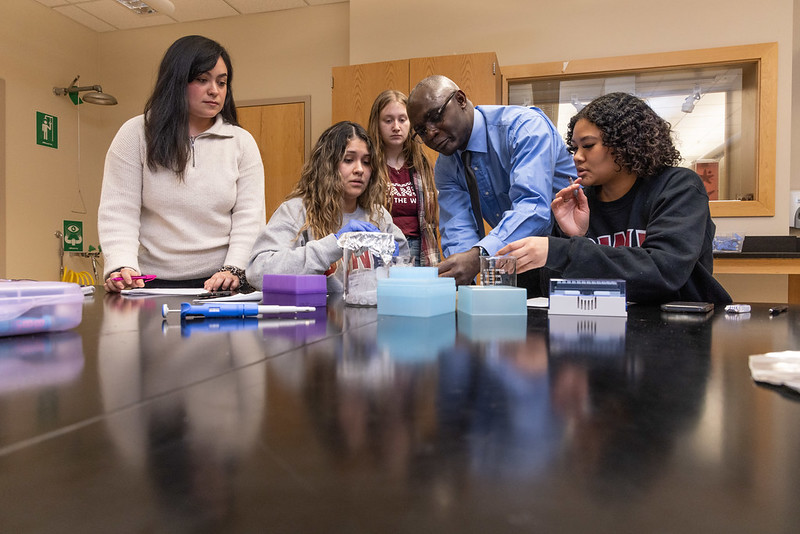Biology
Find Your Research Mentor
Most faculty members in the Department of Biological Sciences mentor undergraduate research.
Usually, students earn credit for their research work by enrolling in BIOL 495 (Research) and/or BIOL 496 (Individual Study) with their faculty mentor.
A brief introduction to faculty members' research interests and possible student research projects is given below. Contact individual faculty members for additional information; project details are established with the faculty mentor. The best way to discover what research possibilities are out there is to ask!

Earn Research Credit
BIOL 495 Research and BIOL 496 Individual Study paperwork must be completed by the end of the schedule change period of the quarter. For each hour of credit, the student invests a minimum of three hours per week on their research project.
Dr. April Binder
Areas of Expertise: Reproductive and developmental biology focused on hormonal control of ovarian function and fertility
My research is focused on understanding female reproductive biology and hormonal imbalances that may lead to ovarian dysfunction, infertility, and metabolic changes. My laboratory uses molecular techniques to examine gene regulation and transcriptional changes that occur downstream of hormone mediated events in ovarian cells. We also utilize a mouse model of Polycystic Ovarian Syndrome (PCOS) to examine the effects of excess androgen on both ovarian and metabolic functions to gain insight into possible causes of female infertility and metabolic dysfunction.
In the Binder lab, we utilize both in vitro (cell culture) and in vivo (mouse model) techniques to gain understanding of ovarian function in response to steroid hormone signaling such as estrogen and androgen receptors. We are also studying the role of hormones that alter adipose tissue function and may lead to increased lipid storage in these cells.
Dr. Lucinda Carnell
Areas of Expertise: behavior genetics in C. elegans; molecular neurobiology
My research involves using the free-living soil nematode, Caenorhabditis elegans to study neural pathways involved in controlling behavior. In particular, I am studying the pathways controlled by the neurotransmitters, dopamine and serotonin. These neurotransmitters are important for modulating behavior in animals from invertebrates to humans. I have performed genetic screens to identify mutants defective in response to dopamine and serotonin using well characterized behaviors modulated by these neurotransmitters such as rates of locomotion and egg laying. One current project involves genetic screening for mutants defective in their response to long-term exposure to serotonin on egg laying and characterizing these mutants by identifying the genes responsible for these altered responses to serotonin.
Dr. Celine Cortes
Areas of Expertise: stable isotope ecology; geometric morphometrics
My research to date has focused on ecology, cranial morphology, and hybridization of North American wolf-like canids. Currently, I am exploring projects that utilize stable isotopes to investigate community ecological dynamics, and projects that utilize geometric morphometrics techniques to investigate patterns of intraspecific and interspecific differences in morphology.
Dr. Blaise Dondji
Area of Expertise: Parasitology and Immunology
My research focuses on the immunology of infectious diseases with special interest on parasite infections. Currently, my work in the lab involves the characterization of the host immune responses to infection and the identification of mechanisms by which infectious agents overcome the human immune system. Since co-infections are frequently reported in human populations, the research questions will be answered in mono- and co-infection models. My laboratory models are (1) Leishmania, a protozoan parasite causing cutaneous and visceral diseases in more the 88 countries around the world; and (2) hookworm, blood feeding intestinal parasite causing anemia and malnutrition to more than 700 million people worldwide. Our understanding of the immune interactions between the host and the infectious agent is one of the basic requirements for the development of improved and/or new control tools such as vaccines and drugs.
Dr. Kris Ernest
Areas of Expertise: terrestrial community ecology; herbivory
As a community ecologist, I am interested in the ways in which species interact with one another. My research program involves various aspects of plant-herbivore interactions. Past projects have investigated effects of herbivores on plants (e.g., balsamroot), herbivore selection of plant individuals, plant responses to herbivores, and overall levels of herbivory in forest canopies. I am also interested in research on dwarf mistletoe in central Washington. Students could work in the field or lab on topics associated with my research or devise (with my assistance) projects of their own interest in community ecology. Potential topics include effects of beavers on the trees they consume, the food-caching behavior of mountain beavers, effects of pocket gophers on shrub steppe plant communities, and interactions between willows and gall-forming sawflies.
Dr. Jason Irwin
Areas of Expertise: environmental physiology; cold tolerance; insects, amphibians
My research interests focus on cold tolerance, especially insects and amphibians that freeze solid to survive northern winters. Potential undergraduate projects range from field studies of geographic distribution and the microenvironmental conditions experienced by animals during the winter to laboratory studies of metabolic and other physiological responses to freezing and thawing. Although I often have potential projects in mind, I am open to new research ideas generated by students.
Dr. Jim Johnson
Areas of Expertise: mycology; molecular systematics; molecular ecology
My research interests include the systematics, evolutionary biology, biodiversity, and ecology of the mushrooms. My main focus has been using DNA sequences to understand the evolutionary relationships between species of fungi and then using the phylogenies to answer basic questions about the evolution characteristics or the ecology of the organisms. Current areas of interest include: 1) the evolution of self-fertilization among the inky-cap mushrooms; 2) the diversity of ectomycorrhizal fungi along precipitation gradients; 3) the diversity and ecology of fungi associated with various mammalian herbivores; 4) the molecular systematics of the mushroom forming fungi (Order Agaricales); and 5) monographic research on Xeromphalina and Heimiomyces.
Dr. Sarah Oppelt
Areas of Expertise: cell and molecular biology, cell metabolism, inflammation, and metabolic disease
My research to date has focused on different aspects of metabolism and how it influences cell fate. Currently, I am working on a project investigating how dyslipidemia causes metabolic distress in tissues, recruits macrophages, and leads to macrophage activation to a pro-inflammatory phenotype.
Dr. Holly Pinkart
Areas of Expertise: microbiology; microbial ecology
My research focuses on microbial ecology and biogeochemistry. Currently, I am involved in a project that examines the diversity and activities of microorganisms in Soap Lake, a lake that is both saline and alkaline. Because the lake supports no life forms larger than zooplankton, it is an ideal setting in which to examine a closed, microbially dominated ecosystem. Students involved in this project will learn a variety of techniques for culturing and characterization of unusual microorganisms, and will have the opportunity to discover new species. Additionally, students can learn and apply molecular techniques to study diversity and phylogeny of these organisms.
Dr. Mary Poulson
Areas of Expertise: plant physiology; photosynthesis; stress response
The major goal of research in my laboratory is to elucidate the mechanisms that plants use to alter their photosynthetic machinery in response to environmental stress. I am particularly interested in the study of photosynthesis. I welcome students who are interested in plant physiology at the whole plant or subcellular-level and will mentor students wishing to work in the laboratory or the field. Examples of research questions that students may pose in my laboratory are: how do conifers respond to drought in conjunction with high light? Or, how do plants alter their photosynthetic reactions when exposed to ultraviolet-B radiation?
Dr. Ian Quitadamo
Areas of Expertise: science education; assessment of critical thinking
My primary research focuses on quantitative assessment of critical thinking skills and investigation of factors that produce measurable changes in CT. Students who participate in this research can expect to learn what critical thinking is, why it is relevant to undergraduate education, and how it relates to scientific literacy. Practical skills that students learn in this research include research design, assessment, measurement, and statistical analysis.
Dr. Linda Raubeson
Areas of Expertise: plant evolutionary genetics; phylogenetics
We use molecular techniques to address a variety of questions in plant evolutionary biology. Areas of focus include: conifer phylogenetics, chloroplast genome evolution and studies of individual plant species of the region. Undergraduates could undertake projects such as: study the evolutionary relationships of a group of plants based on DNA sequence data, characterize a mutation of the chloroplast genome, finish and annotate a chloroplast genome, measure amounts or patterns of genetic diversity in a local species.
Dr. Gabrielle Stryker
Areas of Expertise: Chagas disease / Trypanosoma cruzi, paraflagellar rod proteins, immunology
My lab focuses on two primary areas of investigation:
- The host-parasite relationships between Triatoma spp., the Trypanosomes they transmit, and the mammals that serve as hosts. Triatoma, are the vectors of the single-celled parasite Trypanosoma cruzi, which infects mammals, including 6 - 7 million people, throughout much of Latin America. These abundant insects offer a unique opportunity for students to use both field techniques and molecular biology to elucidate which vertebrates are serving as hosts and which strains of T. cruzi are circulating within a local region. PCR, sequence analysis, and bioinformatics are used to identify the strains of T. cruzi and the source of the blood meal found within the Triatoma.
- The molecular biology and immunology of the paraflagellar rod (PFR) proteins found in the flagellum of Kinetoplastids. These protists are obligatory parasites that include T. cruzi (Chagas disease), T. brucei spp. (sleeping sickness), and several Leishmania spp. The PFR is a unique and complex structure that is critical for cell motility, though little is known about its molecular assembly or its role in the lifecycle of trypanosomatids. PFR proteins are of particular importance in Trypanosoma cruzi , as purified or recombinant PFR proteins have been shown to be immunogenic, protecting mice from a lethal challenge with the parasite.
Dr. Lixing Sun
Areas of Expertise: animal behavior and evolution
My current research areas include 1) collective behavior, 2) behavioral economics, and 3) sexual selection. My students and I resort to a range of traditional and modern tools ranging from molecular technology to artificial intelligence to address and test behavioral and evolutionary hypotheses. In addition to biologists, we collaborate with researchers from many other disciplines such as psychology, anthropology, computer science, and economics. One of our current foci is to understand how Tibetan macaques organize their society and make collective decisions. We welcome motivated, aspiring, and open-minded graduate and undergraduate students to join us for an exciting intellectual journey of discovery.
CWU News

CWU Disability Services aims to provide equitable access to education
February 23, 2026 by Rune Torgersen

CWU faculty member awarded Fulbright post-doctoral scholarship
February 23, 2026 by David Leder
Biology Faculty Drop In Schedule
Questions? Contact Us.
Department of Biological Sciences
Science Building, Room 338
Dr. Clay Arango
(509) 963-3163
arangoc@cwu.edu